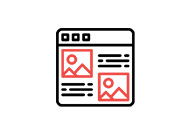You want to grow your business, and you’re convinced that online visibility is the key. So, you’ve built your website, developed content, and started reading up on how to improve your own SEO. In your research, you’ve learned about link building, content creation, and now you’re ready to optimize the content you’ve created, but you have no idea where to start. HTML tags provide a quick and easy way to get your content optimized for users and search engines. When using HTML markup for optimized content, there is a wide variety of ways to optimize, but here are 3 key components for you to know: Titles, Headers, and Internal Links.

WHAT IS HTML
HTML is the underlying code used to create web pages. This coding allows you to structure and format sections, paragraphs, quotes, etc. Essentially, it allows you to organize and format documents, similar to how Microsoft Word works. HTML tags are small parts of coding that tell engines how they should read your content. Think of them as key indicators telling Google what to look for and prioritize on any given page of your site.
TITLES
A major factor in optimizing your content with HTML tags is how you use titles. The title on your page is considered the most important on-site SEO element on any given page. This is the first thing a crawler will look at, and its intent is to clearly describe the purpose of the page it represents. Think of your website as a magazine. When you’re flipping through your favorite magazine, it’s filled with information. How do you decide if you’re interested in an article before even reading it? The title. That article’s title should give you a good idea of what the article is about, and why you should find it interesting. In a very similar sense, the title of each page of your website should give Google a clear idea of what the content on that page is about.
In our experience, this is an area that is missed far more often than it should be – even by other SEO companies. When creating titles, it’s crucial you identify your target keyword for that page. For example, if you are a personal injury attorney, your homepage title should not read, “Home.” That is telling search engines that you want to show up for anyone who is searching for…”Home.” A better title would read, “Denver Personal Injury Law – [Name of company].” Here’s a more in-depth breakdown of writing titles.
HEADERS
Headers are ways to identify key sections of a web page. While this is important for search engines, it is also particularly important for your site’s visitors. A recent study found that 55% of readers will only read your page for 15 seconds or less. This makes clear organization on your page crucial.
Header tags are identified as H1-H6 tags. Usually, your H1 tag is reserved for your page’s main message or title. The further down you go in the Header tag hierarchy, the less significant a header it becomes. For example, if you were to write an outline for a research paper, it would probably look something like this:
- Why this Paper is Amazing
- Incredible Point #1
- Supporting point
- Description
- Supporting point
- Fantastic Point #2
- Supporting point
- Description
- Supporting point
- Conclusion
- Recap
- Incredible Point #1
In that outline, you can clearly see the hierarchy of the organization. The Topic would be your H1. Your “a,b &c” would represent your H2’s, and so on and so forth. You want the same organization and clarity with each page on your website.
As you’re creating these, keep in mind a few principles. First, relevance is key. Don’t throw in random keywords that are irrelevant to the copy they represent. Rather, find relevant keywords that are unique for each section – don’t repeat the same keyword over and over again. Second, don’t feel like you need to excessively use headers. If the content has a natural flow to it, let it flow. Finally, use one H1 tag (and only one) on every page, where possible.
INTERNAL LINKS
Internal linking is a powerful way to show search engines additional content that is relevant the page you’re optimizing. Links are extremely important in improving your credibility with search engines because it keeps your content organized, which the crawlers love. Think of it this way: Google’s number one priority is to provide the best user experience possible for whoever is searching. If you are looking for an accountant, you’ll search for Accounting Services Near Me, and ultimately find Website A and Website B. Website A has one page related to Accounting Services. Website B has a similar page, but it links to a page talking about the most common questions they get about their accounting services, another page reviewing their accounting processes, another page about their philosophy for their accounting services, etc. Which one is the most informative and useful to you, the user? Website B by a landslide. Google sees this, and rewards quality internal linking with better rankings.
We understand that optimizing your content can seem daunting at first. However, if you focus on implementing strategic titles, proper use of headers, and internal linking, you will be on your way to optimized content in no time.


